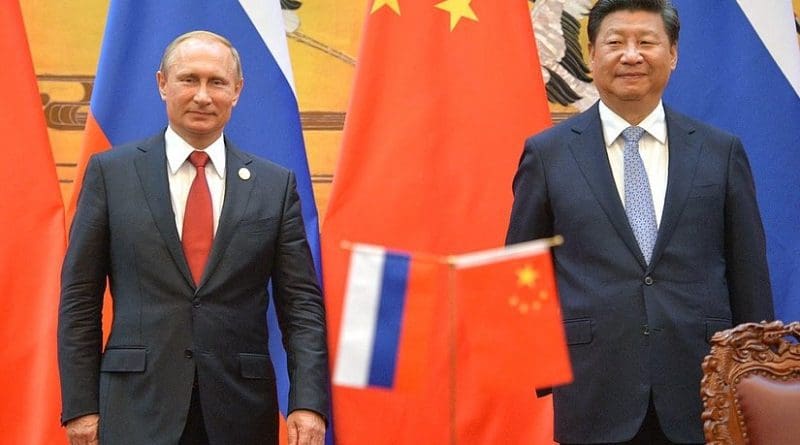Russia-China Strategic Nexus: Hair-Line Cracks Surfacing – Analysis
By SAAG
By Dr Subhash Kapila
Barometric changes in the prevailing state of Russia-China strategic nexus is a significant input for regional and global dynamics. For India such inputs are even more significant for its China foreign policy planning.
Prevailing strategic wisdom postulates that the Russia-China strategic partnership is going strong in response to the geopolitical challenges that the United States poses to Russia in the West and China in the East in Asia Pacific. Russian and Chinese Presidents too were in end-June rhetorically perpetuating this myth when President Putin, paid a flying one-day visit to Beijing to sign more than 30 agreements, mostly economic and scientific.
Related to this visit, two different news-events surfaced, one Chinese and the second Russian which need analysis as they point towards the first visible signs of hair-line cracks in the Russia-China strategic nexus. Debates on the substantive worth of the Russia-China strategic nexus have been ongoing for quite some time.
Two things have held back the full consummation of the Russia-China strategic nexus into a full-fledged Russia –China Military Alliance. The foremost is the “lack of strategic trust” between these two mighty nations arising from their past record of sudden individual swings to the United States. Secondly, and a contemporary evolution is of the growing clash of geopolitical interests in Central Asia between Russia and China.
With the foregoing as the contextual background, one can now attempt to analyse these two recent Chinese and Russian news events which seem to suggest that visible strains are emerging in the Russia-China strategic nexus, more visibly from the Chinese side.
The Chinese Opinion Editorial in The Global Times of July 03 2016contains both direct and implied criticisms of China’s Russian strategic partner in dimensions of their relations ranging from economic and trade relations to the politico-strategic and geopolitical contours which impelled the emergence of this ‘marriage of convenience.
Chinese criticisms reflect complaints that while both sides cheerfully sign a lot of economic and trade contracts and China makes big advance payments to Russia, the Russian side is slow and tardy in implementing the completion of contracts. It further adds that China has gone out of the way to award economic contracts to Russia hoping that this would form the basis of more strong political relations. Implied here also is a call for a rethink of China’s policies in this regard.
Politically, this media piece argues that “Uniting one side to oppose the other side does not secure China’s national interests. China must ponder how to keep its diplomatic independence while conducting global and regional policies.” Significantly, it also asserts that “China should attach importance to joint work with Russia, but cannot overly depend on it (Russia).”
The Global Times elsewhere had earlier reflected that “China and Russia’ strategic partnership was a result of the times, but is totally different from a military alliance such as that between United States and Japan.”
Analysing the above and related posts not quoted here, one thing that strongly emerges is that if “the times change” China can be expected to swing back towards the United States in a repeat of its earlier policy swings. That undermines the substantives’ of the Russia-China strategic nexus as a reckonable factor in global and regional power calculus.
Coming to Central Asia as the most significant growing discord in Russia-China strategic nexus the Chinese Op-Ed complains and is critical of President Putin’s announcement of the proposal to form a ‘Eurasia Economic Partnership’ which besides Russia and Chine also proposes to invite the EEU, India, Pakistan and Iran. The implied criticism ruefully observes that while the United States is reinforcing its presence in the Pacific on China’s doorsteps, Russia is now intending to reinforce its influence in Central Asia.
In sum, analytically it emerges that China is strongly dissatisfied with its strategic partnership with Russia. Since nothing happens in China without official approval at the highest levels, the Global Times Op-Ed needs to be taken as the surfacing of the first visible cracks in the Russia-China strategic nexus.
Evolving geopolitical planetary changes suggest that these hairline cracks can only widen and not lessen as the Chinese economy heads towards stagnation and China begins to call on Russia for re-negotiation of economic deals especially in the energy sector.
Russian President Putin’s statement in Beijing during his June 2016 visit is the second news event which has not lent itself to more detailed analysis. President Putin had called for transforming Russia -China strategic partnership into one of “Comprehensive Partnership & Strategic Collaboration”. President Putin gave an unconvincing spin trying to imply that Russia-China relations had transcended the ‘strategic partnership’ into a more comprehensive relationship. If that be so then why the addition of and separate emphasis on “Strategic Collaboration”? Was it an intended dilution as part of some political signalling to denote a change in the nuances of the Russia-China strategic nexus?
Russian strategic debates also reflect concerns about Russia’s earlier strategic pivot to China. Russian complaints focus on the fact that China does not consider Russia as an effective counterweight to the United States. Russian debates also reflect that no “equitable benefits” have accrued to Russia because of its strategic pivot to China. Disturbing for China would also be a forecast on Russian foreign policy that Central Asia would now replace Syria as the Prime focus in Russian foreign policy focus.
Concluding, one would like to assert that the surfacing of hairline cracks in the Russia-China strategic nexus appears to be a trend-in-the making, and the widening of these cracks depends on the United States capitalising the opportunity by a positive re-set of its Russia policy. The United States needs to recognise as to which is the more bigger threat to US national security interests?

